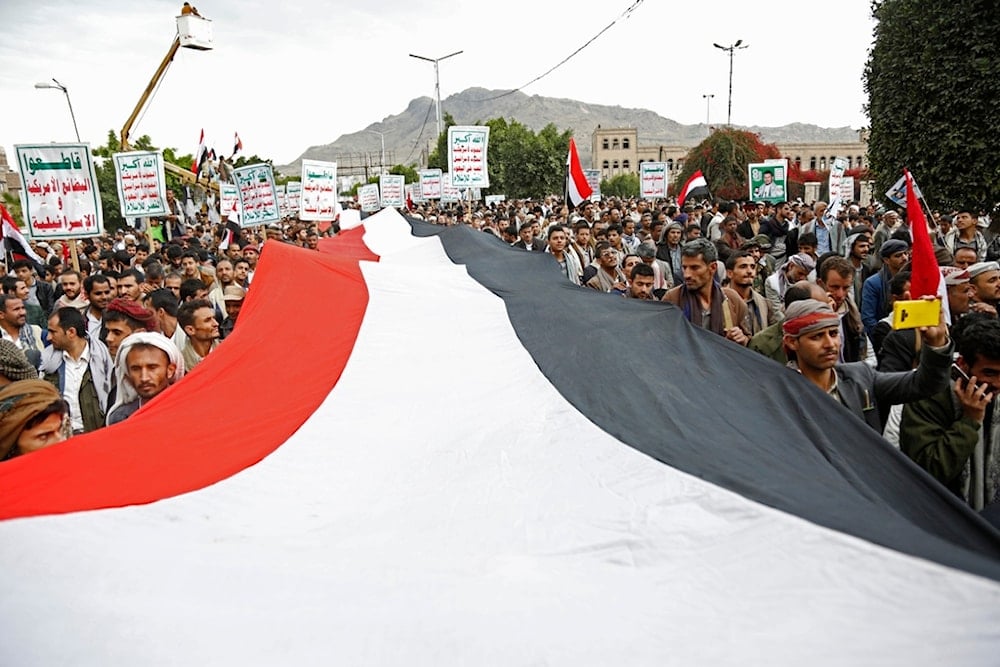Pezeshkian and al-Mashat discuss strengthening ties, Palestine support
The head of Yemen's Supreme Political Council congratulates Iranian President Masoud Pezeshkian on his presidential election victory.
-

Ansar Allah supporters chant slogans as they attend a rally marking eight years for a Saudi-led coalition, Friday, March 26, 2023, in Sanaa, Yemen. (AP)
The head of Yemen's Supreme Political Council, Mahdi Mohammed al-Mashat, on Sunday, congratulated Iranian President Masoud Pezeshkian on his victory in the elections and winning the trust of the Iranian people, during a phone call.
During the call, al-Mashat described the success of the Iranian elections as "a victory for the Iranian people and revolution," stressing that he "looks forward to strengthening the relationship between the two countries in various fields.
He also thanked the Leader of the Iranian Revolution and Republic, Sayyed Ali Khamenei, and the Iranian people for their supportive stances in favor of the oppressed Palestinian people.
For his part, Pezeshkian expressed gratitude to al-Mashat for calling and congratulating him on his victory in the Iranian elections.
He praised the courageous decision of the Yemeni leadership and people in supporting the Palestinian people, saying that "Yemenis have entered this battle with courage," stressing that "the Iranian people and free peoples appreciate what Yemen has done under these difficult circumstances."
"The bitter events in the region are the result of the presence of the Zionist entity and the subversive policies of the West," Pezeshkian said, stressing that "the commonalities between Yemen and Iran are deeply rooted, and we look forward to more relations between the two countries at this stage."
In conclusion, the Iranian president expressed his hope that the siege on the Yemeni people will be lifted and peace will prevail in Yemen.
Iran's Pezeshkian discusses foreign policy, principles in first op-ed
Iran's newly-elected president stated that his administration is dedicated to maintaining Iran's national dignity and global standing "under all circumstances." Additionally, it will advocate for creating a "strong region" instead of one dominated by a single country's pursuit of hegemony and dominance.
In an op-ed published by the Tehran Times, President Masoud Pezeshkian outlined his government's outlook and policy, emphasizing it will focus on opportunities to maintain balanced relations with all nations in line with Iran's economic and national interests, in addition to the needs of regional and global peace and security, saying he "will welcome sincere efforts to alleviate tensions and will reciprocate good-faith with good-faith."
Moreover, he emphasized his opposition to neighboring countries depleting their resources through engaging in unnecessary competition, arms races, or "containment" efforts against each other. "Instead, we will aim to create an environment where our resources can be devoted to the progress and development of the region for the benefit of all."
Pezeshkian mentioned that, following the victory of the Islamic Revolution in 1979, Iran "severed ties with two apartheid regimes, Israel and South Africa," a decision "motivated by respect for international law and fundamental human rights."
While "Israel" remains an "apartheid" regime to this day, Pezeshkian said it added genocide to "a record already marred by occupation, war crimes, ethnic cleansing, settlement-building, nuclear weapons possession, illegal annexation, and aggression against its neighbors."
Don't reward 'Israel' through normalization
The Iranian president-elect further said that "as a first measure" in strengthening ties with neighboring states, his government will "urge" Arab countries to collaborate diplomatically for a permanent ceasefire in Gaza to halt the ongoing massacre and prevent an expanded escalation.
"By leveraging our normative influence, we can play a crucial role in the emerging post-polar global order by promoting peace, creating a calm environment conducive to sustainable development, fostering dialogue, and dispelling Islamophobia. Iran is prepared to play its fair share in this regard."
He underlined that all members of the 1948 Genocide Convention are obligated to take action to prevent genocide, "not to reward it through normalization of relations with the perpetrators."
"We must then diligently work to end the prolonged occupation that has devastated the lives of four generations of Palestinians," he continued.
Pezeshkian continued that he "looks forward" to collaborating with "Turkey, Saudi Arabia, Oman, Iraq, Bahrain, Qatar, Kuwait, the United Arab Emirates," in addition to regional organizations, to deepen economic and trade relations. He added that coordination would also be focused on "tackling common challenges" and working on creating "a regional framework for dialogue, confidence building and development."
Pezeshkian discussed further topics that would dictate his foreign policy moving forward.
Read more: Iran to not bow to any force in the world: Pezeshkian

 4 Min Read
4 Min Read








